Description
Ekurokhol Pharmacodynamics
Hepatoprotective drug, has a choleretic effect. Reduces the synthesis of cholesterol in the liver, its absorption in the intestine and its concentration in the bile, increases the solubility of cholesterol in the biliary system, stimulates the formation and excretion of bile. Reduces lithogenicity of bile and increases the content of bile acids in it. Causes increase in gastric and pancreatic secretion, increases lipase activity. It has a hypoglycemic effect. Causes partial or complete dissolution of cholesterol stones when ingested, reduces the saturation of bile with cholesterol, which promotes the mobilization of cholesterol from gallstones. It has an immunomodulatory effect, affects immunological reactions in the liver: it reduces the expression of some antigens on the membrane of hepatocytes, affects the number of T-lymphocytes, interleukin-2 formation, reduces the number of eosinophils.
Indications
– Dissolution of small and medium-sized cholesterol stones in a functioning gallbladder;
– Prevention of stone recurrence after cholecystectomy;
– biliary reflux gastritis and reflux esophagitis;
– Primary biliary cirrhosis in the absence of signs of decompensation (symptomatic treatment);
– Chronic hepatitis of different genesis;
– acute hepatitis;
– Primary sclerosing cholangitis;
– hepatic cystic fibrosis;
– Toxic (including drug) liver damage;
– non-alcoholic steatohepatitis;
– Alcoholic liver disease;
– biliary dyskinesia.
Contraindications
– Hypersensitivity to the drug components;
– X-ray-positive (high in calcium) gallstones;
– non-functioning gallbladder;
– acute inflammatory diseases of the gallbladder, bile ducts, and intestines; Crohn’s disease;
– cirrhosis of the liver in the stage of decompensation;
– Severe renal, hepatic or pancreatic dysfunction;
– Complete obstruction of the biliary tract;
– biliary-intestinal fistula;
– Frequent biliary colic;
– lactation period;
– Children under 3 years of age (not recommended for use in this dosage form).
Ursodeoxycholic acid has no age restrictions for use, but children under 3 years of age are recommended to use the drug in the form of suspension, as it may be difficult to swallow capsules.
WITH CAUTION
Children over 3 years of age (may have difficulty swallowing the capsules).
PREGNANCY AND BREASTFEEDING
Ekurokhol may be applied during pregnancy only in cases when potential benefit to the mother exceeds possible risk to the fetus. There are no data on excretion of ursodeoxycholic acid with breast milk. If it is necessary to use ursodeoxycholic acid during lactation, breast-feeding should be stopped.
How to use and dosages.
- Inside.
- Children and adults with body weight less than 34 kg are recommended to use Ekurokhol in the form of suspension.
- Dissolution of cholesterol gallstones: Recommended dose is 10 mg/kg/day, which corresponds to:
- Body weight, kg Number of capsules, pcs.
- up to 60 2
- 61-80 3
- 81-100 4
- Over 100 5
- Ekurokhol should be taken daily in the evening before going to bed (capsules are not chewed), drinking plenty of fluids. Duration of treatment – 6-12 months. For the prevention of recurrent cholelithiasis is recommended to take the drug for several months after the dissolution of stones.
- Treatment of biliary reflux gastritis:
- 1 capsule of the drug daily in the evening before going to bed (capsules are not chewed), with a small amount of water. The course of treatment – from 10-14 days to 6 months, if necessary – up to 2 years. Symptomatic treatment of primary biliary cirrhosis:
- Daily dose depends on body weight and is from 3 to 7 capsules (about 14±2 mg/kg ursodeoxycholic acid per 1 kg of body weight).
- During the first 3 months of treatment, the use of 250 mg capsules should be divided into several intakes during the day. After improvement of hepatic parameters the daily dose of the drug can be taken 1 time in the evening.
- The following regimen of administration is recommended:
- 250 mg capsules
- Weight of the body, kg Daily dose (Capsules, pcs.) Morning Afternoon Evening
- 47-62 3 1 1 1
- 63-78 4 1 1 2
- 79-93 5 1 2 2
- 94-109 6 2 2 2
- Above 109 7 2 2 3
- Capsules should be taken regularly without chewing and with small amount of liquid. Administration of the drug for treatment of primary biliary cirrhosis may be continued indefinitely. In patients with primary biliary cirrhosis, in rare cases, clinical symptoms may worsen at the beginning of treatment, for example, itching may become more frequent. In this case, treatment should be continued by taking 1 capsule daily, then the dosage should be gradually increased (increasing the daily dose weekly by 1 capsule) until the recommended dosage regimen is reached again.
- Primary sclerosing cholangitis:
- 12-15 mg/kg/day (up to 20 mg) for 6-24 months (up to several years).
- Cystic fibrosis:
- Up to 20-30 mg/kg/d for 6-24 months or more. Chronic hepatitis of various genesis, nonalcoholic steatohepatitis, alcoholic liver disease:
- The daily dose is 12-15 mg/kg (2-5 capsules in 2-3 intakes, therapy duration is 6-12 months or more).
- Biliary dyskinesia:
- The average daily dose is 10 mg/kg in 2 doses for 2 weeks to 2 months.
- Children over 3 years old are prescribed the drug individually, based on the rate of 20 mg/kg/day.





